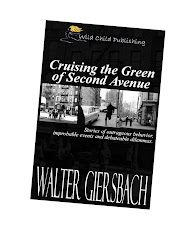Judy asked suddenly on an unnaturally warm winter day, “What
do you think of our spending a year in Cambridge, helping them care for the
baby so Lisa can go back to work?” Zeke
was then a week old.
“Out of the question,” I said. “No way will I babysit for a year. We’re 67 years old.” Massachusetts was a two-and-a-half hour drive
from our center hall four-bedroom colonial in Connecticut. “We’ll visit Cambridge. Regularly.”
When I told a friend I might leave Connecticut to babysit a
grandson, she shouted, “You’re out of your effing mind!”
Judy rolled out the arguments in the coming days as my heart
sank: “This 2,500-square-foot house is too big for empty-nesters,” and Bethel
taxes are outrageously high, child-care is unaffordable, one doesn’t put a
new-born in the care of a commercial institution, and Lisa’s career will
otherwise be jeopardized.
I’m sensitive to the plight of American Career Moms. I’ve written sympathetically
about women in their mid to late thirties, filled with wisdom and
maturity and character to make intelligent choices, who have to halt their career
to raise a child. I knew that when these
women are in their forties they can try to regain the momentum of their
careers, but will they still be interested in what they were trained for two
decades earlier, and will their career fields have left them behind? So they find a job, work for fifteen more
years or so, then spend the final twenty years in retirement before dying. This may be overly dramatic (hey, I’m a
writer!), but it was a solid (to my wife) reason to help out at this stage of
the game.
I made a mental list of the pros and cons of moving. On the credit side was the altruistic
rationale, plus a large amount of money from selling a priced-up house. In the debit column were the loss of friends,
a writing group that was like a second family, a bucolic yard surrounded by
woods where I’d stroll with a beer at sunset, a cat that would have to be
re-adopted by her original mistress, a home that was also two and a half hours
from our son’s family in New Jersey. All
of my reasons were daunting — and irrelevant.
Three months later, we moved into a 20th floor
apartment across from the town reservoir and park, trading space and
environment for a two-bedroom rental. It
was a step back forty years to our first apartments in New York City, except we
were substituting a concierge for cockroaches.
Cambridge’s reverse 911 calls began reminding us to move any
cars for the street cleaners or be towed. The cracked pavement in front of century-old “triple-decker”
houses required Judy, me and Zeke to traipse single file in our little convoy of
baby carriage and market basket. We
faced the bureaucracy of getting new licenses and plates and auto inspections
from angry clerks. Voting privileges
were granted, but did I care?
And then, wondrously, we began feeling like new
parents. Zeke was the charming baby who came
to us every morning. I was enchanted
that he liked my grapefruit (and, with his perfect eyesight, the olives in my
martini at night). It was a joy putting
him in his first swing at the park, buying baby clothes on Arsenal St.,
strolling with him to the Bryn Mawr used book store, story time at the library,
and lunching at Whole Foods.
What I discovered was everything I'd missed when our own children
were growing up and I was commuting two hours in and out of Manhattan for 25
years. Would I have traded it for being
a stay-at-home dad? Perhaps not, but in
Cambridge I didn’t feel like a visitor to my own home town. And being a new parent was an adventure.







